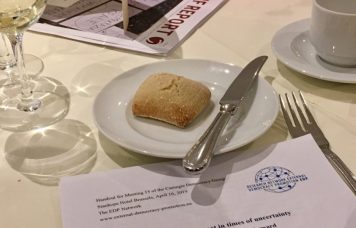Three network members – Julia Leininger, Annika Elena Poppe and Jonas Wolff – presented at the 15th meeting of the Carnegie Democracy Group in Brussels on April 16, 2019. This meeting format regular brings together policymakers, policy experts, and civil society representatives working in democracy (promotion) related fields and ensures continuous exchange in a trusting environment (Chatham House rules apply).
For the democracy group dinner last Tuesday, the topic was “Reviewing Europe’s Support for Democracy (Part IV): Ways Forward”. Julia, Annika, and Jonas had been invited to present the network’s key research findings and translate them into recommendations for this practitioner community. They outlined how new concepts of democracy could address challenges to democracy support in times of uncertainty and highlighted lessons learned as well as key implications for the design of future EU democracy support strategy based on individual as well as work done for the EDP network’s joint policy paper and the special issue on democracy promotion negotiation.
The main argument was that while the quality of democracy has been declining, trends of autocratization can still be turned around. But how would that be possible? By focusing on enabling change processes, a careful balance between the do not harm principle and the willingness to take risks, building permissive, societal change infrastructures and broader change processes, and by avoiding contributing to polarization.
The discussion with representatives from the EU Institutions and member states, civil society and democracy experts in Brussels further looked at the potential new role of the European Union in the transatlantic relations with regards to the international democracy support agenda. Further, how the EU could address internal democratic backsliding in its external democracy support agenda without losing credibility and legitimacy in its actions was elaborated. It was suggested that the EU should not take measures in another country outside of the European Union that wouldn’t be considered as a legitimate action inside of the EU.
For more details on the policy recommendations, please have a look at our PRIF Report.



